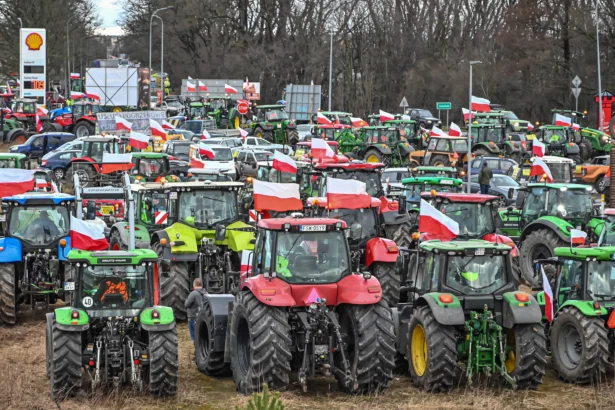Belgian farmers have converged on Brussels for the second time in a month to protest unpopular European Union (EU) policies they say are putting them out of business.
Like their counterparts elsewhere, Belgian farmers decry rising energy costs and cheap food imports from outside the EU that they say undercut local producers.
“We’re here again in Brussels today because the EU isn’t listening to our demands,” Morgan Ody, general coordinator of a prominent farmers’ association, told Reuters.
“We produce the food, but we don’t make a living—because of free trade agreements, deregulation, and because prices are below production costs,” she said.
“We demand that the EU move on this,” Ms. Ody added.
On Feb. 26, frustrated farmers converged on Brussels, where EU agriculture ministers held an emergency meeting to discuss ways of allaying protesters’ grievances.
Recent weeks have seen similar protests—of varying size and intensity—in Germany, France, Spain, Italy, Greece, and Poland.
Farmers across the EU also decry what they see as excessive EU bureaucracy and restrictive “climate-friendly” policies imposed by officials in Brussels.
“We’re being ignored,” Marieke Van De Vivere, a farmer from Belgium’s northern Ghent region, told the Associated Press.
She called on EU ministers to visit farmers working their fields “to see that it’s not very easy due to the rules they impose on us.”
As the agriculture ministers arrived, scores of farmers parked their tractors outside the meeting venue, while hundreds of others blocked roads into the city.
At one point, riot police used water cannons to disperse protesters after piles of tires were set alight near the area where the meeting was being held.
Upon their arrival, EU ministers appeared to voice sympathy for the farmers’ plight.
“There’s a need … to tell farmers that something is changing,” French Agriculture Minister Marc Fesneau told reporters.
“Not only in the short-term,” he added, “but also in the medium and long-term.”
David Clarinval, Belgium’s agriculture minister, insisted that he and other EU officials “clearly hear their [farmers’] complaints.”
“We understand some are in difficult circumstances,” he said.
“But aggression has never been a source for solutions,” he added, referring to increasingly brazen acts of defiance by farmers across the continent.
On Jan. 30, hundreds of farmers parked their tractors outside the EU Parliament building, which had been hosting a summit of European leaders.
While the summit was underway, protesters set fire to bales of hay, pelted police with bottles and eggs, and besieged the country’s largest maritime port.
Visiting agriculture ministers were expected to discuss ways to defuse farmers’ frustrations and address their most pressing grievances.
Proposals include reductions to the number and frequency of farm inspections and exemptions from some environmental rules for small-scale farmers.
Brussels already eased some of its more stringent restrictions following a spate of earlier protests in other EU states.
For example, it removed its goal of reducing farm emissions from its “climate roadmap” and scrapped proposed legislation against the use of certain pesticides.
It also dropped its demand that farmers leave a certain portion of their land fallow for the ostensible purpose of promoting “biodiversity.”
Earlier this year, German officials tried to defuse the crisis by promising to maintain tax exemptions for farmers while phasing out farm subsidies over three years.
After massive protests in France, Paris dropped plans to scrap diesel subsidies and pledged to ease environmental rules on agricultural production.

But farmers—in France, Germany, and throughout the EU—say the concessions aren’t enough and have vowed to keep protesting until all their demands are met.
Characterized by the use of agricultural vehicles to block highways, roads, and border crossings, protests by European farmers first began in the Netherlands in 2019.
Since then, they have spread to several other European countries where farmers and other agricultural workers nurse many of the same grievances.
Rallies in Spain, Poland
The Feb. 26 protest in Brussels coincided with similar actions in Madrid, where Spanish farmers voiced similar complaints by beating drums and blocking roads.
“These [EU] rules are intolerable,” Roberto Rodriguez, a farmer from Spain’s central Avila province, told Reuters.
“We’re tired of the bureaucracy,” he added. “They want us to work the fields during the day and deal with paperwork at night.”
Earlier this month, Spanish farmers blocked roads across the country to protest mounting inflation and unfair competition from producers in non-EU states.
“Farmers face the same problems throughout the EU,” the vice president of a leading Spanish farmers’ association said at the time.
With protests underway in Brussels and Madrid, Polish farmers, too, staged demonstrations against the influx of cheap grain from next-door Ukraine.
Polish farmers have long decried a 2022 decision by Brussels to wave duties on Ukrainian food imports.
In recent weeks, Polish farmers have disrupted traffic nationwide and imposed a de facto blockade on Poland’s border with Ukraine.
On Feb. 26, they also blocked a border crossing with Germany to press their demands.
“This is a show of solidarity,” Adrian Wawrzyniak, a spokesman for a prominent Polish farmers’ union, said.
“Polish and German farmers will not allow these goods from Ukraine to continue to enter the European market,” he added.
Speaking from Warsaw, Polish Prime Minister Donald Tusk said farmers’ grievances must be addressed “at the European level.”
“Poland is the first EU country [on the border with Ukraine], but this is a problem of the EU as a whole—of EU agriculture as a whole,” Mr. Tusk told reporters.
“The EU should resolve this issue at the European level,” he added, “including supporting Polish farmers.”
Reuters and the Associated Press contributed to this report.
From The Epoch Times
